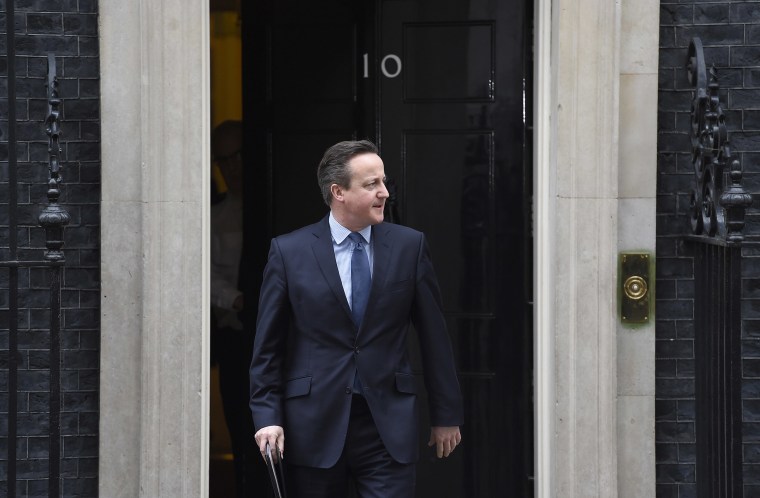British Prime Minister David Cameron said Thursday he made a profit on shares of a Panamanian trust set up by his father that was named in the "Panama Papers" document leak this week.
In an exclusive interview with ITV, NBC News' British partner, Cameron said he sold the shares in 2010. The fund set up by Cameron's father, Ian, was included in leaked documents detailing offshore accounts of leaders around the world.
"It has been a difficult few days, reading criticisms of my father and his business practices — my dad, a man I love and admire and miss every day," Cameron told ITV political editor Robert Peston.
RELATED: Why aren't Americans included in the Panama Papers?
But Cameron denied that Blairmore, the company set up in the Bahamas and Panama, was established to avoid taxes. He said anyone could have bought into it, and "it was subject to full U.K. taxation."
"I think a lot of the criticisms are based on a fundamental misconception, which is that Blairmore, a unit trust, was set up with the idea of avoiding tax," Cameron said. "It wasn't. It was set up after exchange controls went so that people who wanted to invest in dollar-denominated companies could do so."
The so-called Panama Papers involved a massive cache of 11.5 million documents that detail a network of banks and law firms that help many of the world's most powerful people hide money in offshore accounts, according to the International Consortium of Investigative Journalists (ICIJ) which coordinated their release.
Cameron told ITV that he and his wife owned 5,000 shares of Blairmore and sold them for around 30,000 pounds (around $42,100 USD) in 2010.
"I paid income tax on the dividends. There was a profit on it but it was less than the capital gains tax allowance so I didn't pay capital gains tax. But it was subject to all the UK taxes in all the normal way," Cameron said.
"So I want to be as clear as I can about the past, present and future. Because frankly I don't have anything to hide," he said.
RELATED: Panama Papers: Iceland's Prime Minister David Gunlaugsson resigns
The data released originated with a law firm based in Panama called Mossack Fonseca. Mossack Fonseca co-founder Ramon Fonseca told Panama's Channel 2 television network that the documents had been stolen in a hacking attack, and said the firm did not engage in wrongdoing
The group of journalists that released the documents said it had also tied the movement of $2 billion by associates of Russian President Vladimir Putin.
"I would reject the premise or the assertion that we're in any way involved in the actual leak of these documents," said State Department deputy spokesperson Mark Toner said Thursday.
At issue is the Organized Crime and Corruption Reporting project, an investigative journalism group that receives some of its funding by USAID and produced one of the root stories on the Russia related documents.
The OCCRP is a part of the International Consortium of Investigative Journalists which received the documents.
"Obviously, these are the kind of organizations that USAID has and continues to fund. But not specifically to go after any particular government," Toner said. "We have no editorial control over their reporting. You know, they're allowed to and permitted to cover whatever they want."
This article originally appeared on NBCNews.com.
